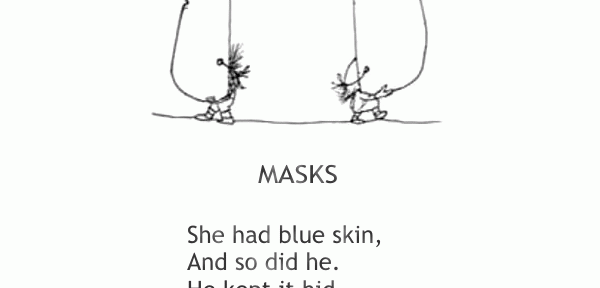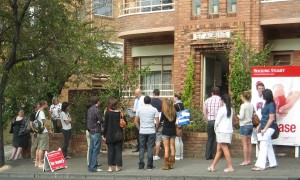They try to figure us out
https://www.incapsula.com/blog/bot-traffic-report-2013.html
#wearedatabase
What defines a generation? Born in the same time bracket? But what if your parents got you really young, but your friend’s parents got their kids late? So you & your mate might be 15 years apart, but you were both raised by people from the same generation/same time bracket/same historic background…so you are both confronted with same influences, but have different timelines and subliminal hums in your background…
So, what makes the fine grain? There are generations between generations, and types between categories, yet where does natural empathy and true understanding end?
Apr 25, 2014 - LinkedIn article by James Arvanitakis Professor of Social & Cultural Analysis· University of Western Sydney
It is obvious that the Australian economy is facing a number of adjustments. The closure of Ford and Holden, as well as the recent announcement of Qantas, highlights that the opportunities that once existed, no longer exist.
Continue reading “Jobs of tomorrow”

The biggest development challenges for the future stem not from lack of global finance but lack of global governance http://t.co/yom2PHVxNP
— Ilona Kickbusch (@IlonaKickbusch) May 1, 2015
I don't know right from wrong. Right & Wrong don't know either. They's sitting either side of me. Three of us. Waiting. Right. Uh? Wrong.
— Kipplewitz (@kipster003) April 17, 2015
About Ayn Rand
While in high school, she determined that she was an atheist and that she valued reason above any other human virtue.
 Ayn called her philosophy “Objectivism”, describing its essence as “the concept of man as a heroic being, with his own happiness as the moral purpose of his life, with productive achievement as his noblest activity, and reason as his only absolute.” She considered Objectivism a systematic philosophy and laid out positions on metaphysics, epistemology, ethics, political philosophy and aesthetics.
Ayn called her philosophy “Objectivism”, describing its essence as “the concept of man as a heroic being, with his own happiness as the moral purpose of his life, with productive achievement as his noblest activity, and reason as his only absolute.” She considered Objectivism a systematic philosophy and laid out positions on metaphysics, epistemology, ethics, political philosophy and aesthetics.
What an utterly inspiring woman.
en.wikipedia.org/wiki/Ayn_Rand
Truth has rough flavours if we bite it through.
[George Eliot]
You have 4 weeks to check out the fab ‘Abbottsolutely hopeless’ poster by @magzarian – up in 64 Regent St Chippendale until end of March
See at 64 Regent St Chippendale #abbotsolutelyhopeless pic.twitter.com/pbqpk6NfT1
— Abbottsolutelynot (@Abbottsolutely) February 23, 2015
SHOULD YOU CALL THAT MEETING?
by Wendy MacNaughton
Everyone benefits when great minds meet, yet most office meetings are anything but great. How can we free up our colleagues to do more work that matters?
Step one: Believe that it’s possible. Step two: Think before you call that meeting.

Good old Goethe – His Theory of Colours by Johann Wolfgang von Goethe is a book about the poet’s views on the nature of colours and how these are perceived by humans. Published in 1810, it contains detailed descriptions of phenomena such as coloured shadows, refraction, and chromatic aberration.
 The Theory of Colours stands as an absorbing account of the philosophy and artistic experience of colour, bridging the intuitive and the visceral in a way that, more than two hundred years later, continues to intrigue.
The Theory of Colours stands as an absorbing account of the philosophy and artistic experience of colour, bridging the intuitive and the visceral in a way that, more than two hundred years later, continues to intrigue.
On Wikipedia is more about it, a quite interesting read
en.wikipedia.org/wiki/Theory_of_Colours
Philipp Otto Runge was a Romantic German romantic painter and draughtsman. In 1803, on a visit to Weimar, Runge unexpectedly met Johann Wolfgang von Goethe and the two formed a friendship based on their common interests in color and art. Runge’s interest in color was the natural result of his work as a painter and of having an enquiring mind.
He arrived at the concept of the color sphere sometime in 1807 by expanding the hue circle into a sphere, with white and black forming the two opposing poles.
From 'Elders' with Andrew Denton and Rosalie Kunoth-Monks
http://www.abc.net.au/tv/elders/transcripts/s2757492.htm
ANDREW DENTON V/O: Rosalie was born in 1937, by a creek bed at Utopia Station, in the Central Australian desert. Her mother was a traditional tribal woman. Her father was of mixed heritage or in her words “three quarter German.” Two vastly different backgrounds, coming together, right from the start. She lived with her mother’s people for her first years; it was the place she felt she belonged.
ANDREW DENTON: What strengths do you think you inherited from your mum and dad?
ROSALIE KUNOTH-MONKS: Specially from Mum I think I inherited the stability and the capability of loving without smothering.
ANDREW DENTON: Mmm.
ROSALIE KUNOTH-MONKS: Mmm.
ANDREW DENTON: And your dad?
ROSALIE KUNOTH-MONKS: From Dad, I guess it was more the European things, I mean I remember he told us in language that we were going to a place called “school” and he picked up a book and he said “You will be able to talk from this book, you will read”. We looked at each other, my brothers and I, “What is ‘read’?” New word. And he said “From now on, for the next three or four weeks, you going to talk English, I’m not going to talk language to you, crash course in English”. Of course we went silent, we didn’t know very many words in English.
ANDREW DENTON V/O: Another key influence was Rosalie’s grandmother, Amelia. The matriarch of the family on her fathers’ side, Amelia had married a white man.
ROSALIE KUNOTH-MONKS: She experienced tremendous amounts of racism from her husband’s side of the family and she’d walked straight and tall, right in the midst of that in a small town such as Alice Springs. And I guess a lot of who I am today is due to my grandmother on my father’s side and also with my mother and her people out at Utopia.
ANDREW DENTON V/O: When Rosalie was 10, Amelia decided it was time for St Mary’s boarding school.
ROSALIE KUNOTH-MONKS: St Mary’s as a whole was to me foreign simply because I hadn’t seen so many children in one spot and the other thing was that they were all Aboriginal – black kids. And the other thing I think that struck me was that I had been told that prior to going to a place called “school” that I had to be boiled, to make me lighter or more white. So I thought, they’re going to boil all these kids plus my brothers and I and it was a very real feeling and it stuck with me for many years because, um, somehow right at the beginning my colour was not acceptable.
ANDREW DENTON: You must have been terrified.
ROSALIE KUNOTH-MONKS: I was, I was, yeah.
Read the complete transcript and watch the video here
Can't sleep tonight, thoughts with my French cartooning colleagues, their families and loved ones #CharlieHebdo pic.twitter.com/LqIMRCHPgK
— David Pope (@davpope) January 7, 2015
Besides all the other chaos that lined up in my life this year I will also have to move house soon. Now, while that is a do-able task in principle, the way it is organised here in Australia/Sydney is simply a joke, a farce designed to screw you over repeatedly during the entire process of inspecting, applying and moving in.
It starts with the early realisation that none of the real estate ads actually tell you what the place is really about. These ads don’t show the square meters of a place, they don’t give you proper photos or a (non-fiction) floor plan, and the description is most of the time shockingly incorrect, not to say an outright lie. So you have no other choice than to inspect every single rat hole, even though things could be shortened so easily but simply supplying enough and decent information in the first place.
So, you rock up at the place, and then there is this bunch of others. The other inspectors. They are in the same mood like you, not wanting to be there, but having to. And then the real estater appears – a snake-oil offering car-sales(wo)men who is annoyingly cheery, often ridiculously overdressed and either completely ignorant or incompetent, or arrogant and just as clueless. (Adrian and Walter: this does not include you! You were beautifully different 😉
And then – there they are: your glorious 8 1/2 minutes. Eight and a half minutes (+/-), the time you have to hastily rush through a place, trying to find out if this place is alright and whether you could spend some time of your life in there, and make the biggest investment of the year on it.
 And within a blitz they’re gone, your 8 1/2 minutes. You walk out, and can’t remember a thing. You’ve seen too many other people in there, everybody asking questions, no time to let in the atmosphere of the place, or any other particulars and details for that matter.
And within a blitz they’re gone, your 8 1/2 minutes. You walk out, and can’t remember a thing. You’ve seen too many other people in there, everybody asking questions, no time to let in the atmosphere of the place, or any other particulars and details for that matter.
So, with the little information your brain might still hold you then try to make sense of the place. Try to recall what was important. Yes, you did bring a list to tick off, but atmosphere or charisma aren’t something that can be ticked off easily. Especially not under pressure, surrounded by loads of grumpy strangers, and held against practicality. Atmosphere can only be felt, experienced.
If you are lucky enough you will get a break after an inspection. In this break you might be able to recall some of the most relevant features that might make your life bearable in this last place that you’ve just seen. But the truth is, most of the times you don’t even have these 5 crucial minutes of reflection, because you have to stress off to the next place, because – as already mentioned – you need to inspect as many as places as possible because they don’t give you enough information in the first place…
So, after a few weekends of doing this, throw in a few additional inspections during the week, your mind gets completely clogged up with too many places and too many particulars, all of which make no sense anymore when trying to remember a place.
At roughly this stage of endless inspections you decide: this is it, I will hand in an application now, just get this over and done with. So you get in touch with the next real estater – well, and then the actual process of snake oil selling begins. While you tell the realo you would like to have another look before you make a decision, he says you need to make a deposit. So it will be a $500 look. But even then you are given only a few minutes, and during another inspection the realo is holding at ‘your’ place that you have already applied and paid a deposit for. So there they are again, all these people asking all these question, and there are you again, overloaded, confused, trying to make sense of it all, and 8.5 minutes later you’re back out again, and still have no clue what this place is about – but have already paid for it.
And because real estaters are eager beavers, by this stage they will have already up-tangled you in the full-Monty of the scrutinising application process (while you still have not had a proper second look at the place). They will have checked you out, your history and everything else about each second of your life they want you to put in their ‘tenancy forms’, only to then call you with the “good news” – You Have Been Approved! (while you still have not had a proper second look at the place) Fuck mate, OF COURSE have we been approved, we will send you $25,000 every year while being completely fuzz-free people, who would not want us?? But the realo makes it sound as if they’re doing us a favour. And then they want more money, bonds and 6 weeks rent upfront and whatnot. But they few things that he and you agreed on need repairing at the new place, these will not get mentioned anymore the moment you sign and pay the first money.
From then on anything YOU might want becomes completely irrelevant. From now on everything will only about spin around what deal the real estater is going to make, on your costs.
And there you are – you have just rented a place you have never really seen, without any chance of steering the process any differently that how it just happened.
This sad approach to renting just completely sucks! 🙁